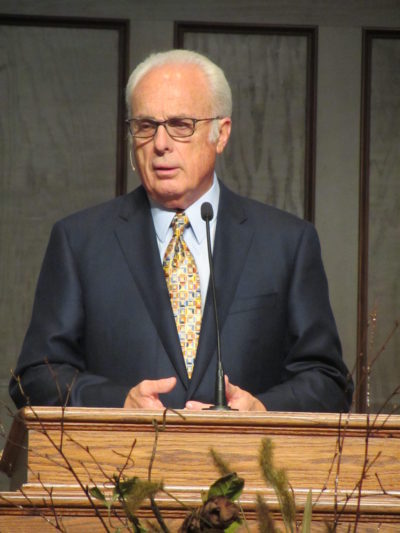On Wednesday, school president John MacArthur welcomed seminary students to The Master’s Seminary. After he discussed the recent accreditation probation (more on that in this and future posts), he was asked about his recent blog posts about social justice. I have most of the audio of his answer and a transcript of all of it. In it, he goes beyond his recent blog posts to discuss why he believes a focus on social justice is a threat to the gospel. The transcript begins just below and a link to the audio follows the transcript.
Question:
I’ve been keeping up with your blog posts on Grace to You. You’ve been talking about social justice is an issue now. You said Wednesday you’re going to mention what the hindrances to the gospel were entitled with. Do you mind giving us a sneak peak today?
John MacArthur:
Well, that wouldn’t be fair. I’m not going to say … I wrote that already, but … Let me just give it to you in simple form. Obviously, social justice, which means equity in social treatment, right? Social justice means equity in how you’re treated socially. It’s not legal justice. I mean, we believe that all people should have legal justice, justice under the law. That’s never going to happen, either. You got people in prison who didn’t do something they were sentenced to prison for. You’ve got a lot of people who’ve been treated wrongly, even under the law.
But social justice means social equity, making sure everybody gets the social equity. That’s never going to happen in a fallen world, in the best of circumstances. But that is not the church’s concern. Let me tell you what the problem is. The mindset of social justice is that certain people are victims. You will notice what’s called intersectionality. There’s an overlapping victimization pattern coming now. You can see it all in bold relief at the recent Southern Baptist convention.
The LGBTQ people are abused, and abused people, their abused category. So they are victims of discrimination. Women are victims of discrimination. You even have Thabiti Anyabwile, my friend, writing an article apologizing to Beth Moore, for I don’t know what. For being part of the male conspiracy against women, because women have been collectively abused. They’re also victims.
Then you have the racial minority issue, where they have been also victims. When you bring those together, you come up with this new concept of intersectionality, so that it would play out like this. If you are a woman, you’re a part of a victim class. If you’re a black woman, you’re doubly part of the victim class. If you’re a homosexual or lesbian black woman, you are the most empowered human being in this culture. You have moral authority, because you’re in multiple victim classes. So that’s what’s going on.
You see, all those … You got homosexuals, women, men, racial issues, ethnic groups, all mingled together, and now the Southern Baptist convention is apologizing to all of the victims. This I think is a complete disaster for the gospel, because the gospel says you are not a victim. You are a perpetrator of sin and rebellion against God. If you recategorize all those people as victims, you cut them off at the start with the gospel.
Most of these people talking about social justice are concerned about it at the back end of the gospel. You know, are you really a believer if you don’t care about that? Well, of course we care about that. But when you turn people into victims … I talked about the higher rate of abortion among black women in New York City. 75 percent of babies are killed in the womb. I was just afraid, because that was not something that … That was not the biggest issue. That is a big issue. That is murder.
Fornication is sin. Adultery is sin. Homosexuality is sin. Stealing is sin. Lying is sin. Cheating is sin. But if I turn all these people into victims, I’ve cut them off from the essential necessity in the gospel, and that is full culpability for your own sin. So I’m asking these people all the time, why aren’t you preaching against sin, regardless of who they are? Men, women, homosexual identity people, or ethnic groups, whatever they are.
I was thinking about 2 Corinthians, 5:16. Paul says, “We no longer see any man in the flesh. We don’t even see Christ in the flesh.” I don’t see people in the flesh. I see them with the eyes of God. If I stop at their flesh, and get stuck, at that point, I have missed the whole point of the gospel. That what concerns me about the Martin Luther King elevation. The man denied the authority of scripture, denied the trinity, denied the deity of Jesus Christ, denied the gospel, and lived an immoral life. How does he become heroic? Only if you look at him in the flesh.
God doesn’t see him in the flesh. God sees him in his heart attitude toward Him. We went and … people who say they’re evangelicals get completely consumed with the flesh, and with what’s happening in the physical world, and then make those people feel like they’re all victims. This is no good service to them. Are there inequities? You bet. I wrote about them in that first blog. I’ve seen it.
Read the book, The Blood Land. Between Russia and Germany prior to World War II, as many as 15 million people were killed. None of them in a military uniform. None of them in a war. They were just massacred. 15 million people. That takes a lot of work to kill 15 million people, one at a time. Are there atrocities in the world? You bet. Stalin kills 50 million. Hitler kills 6 million Jews. 2,000 Nigerians are slaughtered in the last week.
This is a tough place to live. Sin has consequence. It has social consequence. It has deadly consequence. I’m not denying the curse of Adam. I’m not denying that the sins of the fathers are visited upon the third and fourth generation. This is a sinful generation right here. Sinful fathers in this generation are going to make life really difficult for the next three, four generations. But nobody ever went to hell for the sin of Adam. Nobody ever went to hell for the sins of the fathers. They go because they believe not in Christ, and because they haven’t confronted their own sin in an honest way.
So all this talk is simply looking at people on a fleshly level, and that’s the wrong look. That’s why it’s not a gospel reality, because it stops the gospel dead in its tracks at the start. You are not a victim. You are a perpetrator of sin against God, and in all.
The Bible warns, and I’ll get into this Sunday morning, but if you’re a watchman, and you don’t warn, the blood of those people is on your hands. If these people have a message, the message ought to be forget the history, forget the past, forget what went wrong, forget a fallen world … You better deal with your sin. That’s gospel. Turning people into victims is not gospel.
That just confuses everything, because all among us, let’s be honest … You’re letting them blame God. This is not new. Adam, what did he say? The woman … He didn’t blame me. He went to sleep single. He did not pick Eve. She showed up, by the creative power of God. I’m in the mess I’m in because of you. That’s where it has to go. Then you have to convince some person that there’s a good, gracious, loving God in heaven, who has turned you into a victim.
How in the world can reformed people believe this when they believe that God is sovereign over absolutely everything, and never does evil? This so confounds the gospel at its basic premise of the personal, individual sinfulness of every person. I’m going to preach on Ezekiel 18 eventually, once I get all this going.
God says, “Every soul is mine.” Wow. “Every person is mine. I’m behind your life. I have directed that life, and I hold you completely responsibility to repent.” That’s the message of the gospel. That’s the message that must be preached. That’s the message that Ezekiel preaches in chapter 18, and at the end he says, “Forget about blaming somebody else, and repent.” Great gospel chapter.
It is hard for me to see how it can be wrong to strive for equal social treatment for all. One may advocate for traditional Christian redemption and for equal social treatment at the same time without doing violence to either one. Where Christians have failed to treat others the way we want to be treated, remorse and apologies are in order. I learned that in kindergarten (well preschool, because I was evicted from preschool since I hadn’t learned that yet). Being honest about historical facts (e.g., native Americans and the trail of tears, or slavery or the captivity of Japanese) doesn’t compromise the gospel.
[email-subscribers namefield=”NO” desc=”Subscribe to receive notification of new posts.” group=”Public”]

